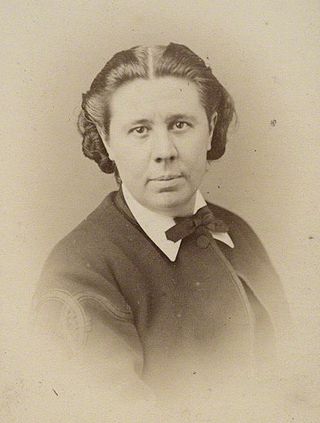Related Research Articles

The Keeper or Master of the Rolls and Records of the Chancery of England, known as the Master of the Rolls, is the President of the Civil Division of the Court of Appeal of England and Wales and Head of Civil Justice. As a judge, the Master of the Rolls is second in seniority in England and Wales only to the Lord Chief Justice. The position dates from at least 1286, although it is believed that the office probably existed earlier than that.
The title of Earl of Gloucester was created several times in the Peerage of England. A fictional earl is also a character in William Shakespeare's play King Lear.
The English Woman's Journal was a periodical dealing primarily with female employment and equality issues. It was established in 1858 by Barbara Bodichon, Matilda Mary Hays and Bessie Rayner Parkes. Published monthly between March 1858 and August 1864, it cost 1 shilling. After 1860 the Journal was published by Victoria Press in London, which was run by Emily Faithfull (1835–1895). She employed women workers, contrary to current practice in that period.

Emily Faithfull was an English women's rights activist who set up the Victoria Press to publish the English Woman's Journal.

The British Poet Laureate is an honorary position appointed by the monarch of the United Kingdom, currently on the advice of the prime minister. The role does not entail any specific duties, but there is an expectation that the holder will write verse for significant national occasions. The origins of the laureateship date back to 1616 when a pension was provided to Ben Jonson, but the first official holder of the position was John Dryden, appointed in 1668 by Charles II. On the death of Alfred, Lord Tennyson, who held the post between November 1850 and October 1892, there was a break of four years as a mark of respect; Tennyson's laureate poems "Ode on the Death of the Duke of Wellington" and "The Charge of the Light Brigade" were particularly cherished by the Victorian public. Three poets, Thomas Gray, Samuel Rogers and Walter Scott, turned down the laureateship. The holder of the position as at January 2023 is Simon Armitage who succeeded Carol Ann Duffy in May 2019 after 10 years in office.

Justice of the Common Pleas was a puisne judicial position within the Court of Common Pleas of England and Wales, under the Chief Justice. The Common Pleas was the primary court of common law within England and Wales, dealing with "common" pleas. It was created out of the common law jurisdiction of the Exchequer of Pleas, with splits forming during the 1190s and the division becoming formal by the beginning of the 13th century. The court became a key part of the Westminster courts, along with the Exchequer of Pleas and the Court of King's Bench, but with the Writ of Quominus and the Statute of Westminster, both tried to extend their jurisdiction into the realm of common pleas. As a result, the courts jockeyed for power. In 1828 Henry Brougham, a Member of Parliament, complained in Parliament that as long as there were three courts unevenness was inevitable, saying that "It is not in the power of the courts, even if all were monopolies and other restrictions done away, to distribute business equally, as long as suitors are left free to choose their own tribunal", and that there would always be a favourite court, which would therefore attract the best lawyers and judges and entrench its position. The outcome was the Supreme Court of Judicature Act 1873, under which all the central courts were made part of a single Supreme Court of Judicature. Eventually the government created a High Court of Justice under Lord Coleridge by an Order in Council of 16 December 1880. At this point, the Common Pleas formally ceased to exist.
The English College, Lisbon was a Roman Catholic seminary that existed from the 17th century to the 20th century.
Edward William Grinfield (1785–1864) was an English biblical scholar.

Matilda Mary Hays was a 19th-century English writer, journalist and part-time actress. With Elizabeth Ashurst, Hays translated several of George Sand's works into English. She co-founded the English Woman's Journal. Her love interests included the actress Charlotte Cushman, with whom she had a 10-year relationship, and the poet Adelaide Anne Procter.
The Evangelical Magazine was a monthly magazine published in London from 1793 to 1904, and aimed at Calvinist Christians. It was supported by evangelical members of the Church of England, and by nonconformists with similar beliefs. Its editorial line included a strong interest in missionary work.
The Phytologist was a British botanical journal, appearing first as Phytologist: a popular botanical miscellany. It was founded in 1841 as a monthly, edited by George Luxford. Luxford died in 1854, and the title was taken over by Alexander Irvine and William Pamplin, who ran it to 1863 with subtitle "a botanical journal".
References
- ↑ Gerry Holloway (2005). Women And Work In Britain Since 1840 . London: Routledge. p. 216. ISBN 0415259118.
- ↑ Hunt, Felicity. "Faithfull, Emily". Oxford Dictionary of National Biography (online ed.). Oxford University Press. doi:10.1093/ref:odnb/37409.(Subscription or UK public library membership required.)
- ↑ Norman, Jeremy M. "Emily Faithfull Founds the Victoria Press for the Employment of Women". History of Information, Exploring the History of Information and Media through Timelines. Retrieved 29 November 2022.
- ↑ Rendall, Jane (2004). "Langham Place group" . Oxford Dictionary of National Biography (online ed.). Oxford University Press. doi:10.1093/ref:odnb/93708. ISBN 978-0-19-861412-8 . Retrieved 29 November 2022.(Subscription or UK public library membership required.)
- ↑ "The Oxford Dictionary of National Biography" . Oxford Dictionary of National Biography (online ed.). Oxford University Press. 2004. doi:10.1093/ref:odnb/93708.(Subscription or UK public library membership required.)
- ↑ Waddington, Patrick (2004). "Monson, Theodosia, Lady Monson (1803–1891), dilettante and promoter of women's rights" . Oxford Dictionary of National Biography (online ed.). Oxford University Press. doi:10.1093/ref:odnb/59337.(Subscription or UK public library membership required.)